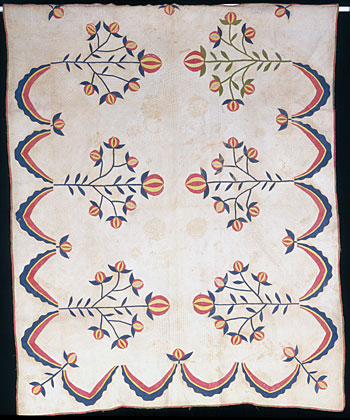
Cotton tulip tree quilt made by an unknown slave owned by Alice Haggin of Woodford County, ca. 1850. A study of slave quilts held in museum collections across the country found that not a single slave quilt maker was fully identified. The earliest tulip designs come from Persia, where the flower grows wild. A legend holds that a young Persian boy fell in love but was rejected. He fled to the desert where he died of a broken heart. Tulips sprang forth from the desert sands where his bitter tears had fallen. The flowers became the symbol of perfect love. KHS Collections.
